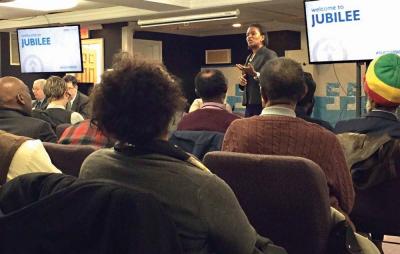January 29, 2015
 State Senator Linda Dorcena Forry spoke at a meeting last Thursday evening at Jubilee Christian Church in Mattapan. Photo courtesy Sen. Forry's office.
State Senator Linda Dorcena Forry spoke at a meeting last Thursday evening at Jubilee Christian Church in Mattapan. Photo courtesy Sen. Forry's office.
Five years after a catastrophic earthquake rocked Haiti, the ongoing impacts of the disaster were evident last Thursday night at an event in Mattapan designed to inform the community about a new federal program that will help an estimated 5,000 Haitians per year join their family members in the United States.
The event, held at the Jubilee Christian Church in Mattapan Square, was hosted by State Senator Linda Dorcena Forry in conjunction with United States Citizenship and Immigration Services (USCIS) and the Mayor’s Office of New Bostonians. State Representative Dan Cullinane and City Councillors Tim McCarthy and Charles Yancey were also in attendance.
The program in focus, known as the Haitian Family Reunification Parole Program (HFRP Program), enables eligible Haitians who have already applied for an immigrant visa to the United States to spend the final two years of their waiting period in this country with their family. The HFRP program does not itself confer any legal immigration status to beneficiaries.
Application to the HFRP Program is by invitation only. Beginning on February 2, 2015, the Department of State’s National Visa Center (NVC) will begin sending out written invitations to American citizens and lawful permanent residents who are eligible to apply to the program on behalf of their relatives living in Haiti. Potential Haitian beneficiaries cannot apply for themselves.
Senator Forry introduced the event by stressing the degree of collective action over several years that had gone into pushing the federal government to create the HRFP Program. Later in the evening, she referenced the role that a similar parole program for Cuban immigrants, in place since 2007, had played in setting a precedent.
“If you’re doing it for the Cubans, then surely you can do it for the Haitians,” said Forry, emphasizing the scale of the humanitarian disaster caused by the 2010 earthquake.
Much of Thursday’s discussion centered on the difficulties that one must navigate while trying to fill out USCIS paperwork, including both scams and advice from friends that is well-intentioned but misguided. Officials emphasized that the only individuals who are capable of providing proper assistance are legal attorneys and accredited representatives who have been approved under the Department of Justice Board of Immigration Appeals.
Both the panel and those in the audience spoke of the scams that abound: fake websites that seek to imitate USCIS.gov (USCIS.com and USCIS.org are a common trap); fradulent officials who sell forms that are available for free on USCIS.gov; individuals who claim that they have special connections and can help someone circumvent the normal process for a fee; and phone calls in which someone posing as a USCIS official tells an applicant that they must pay a fee to prevent the denial of their application.
In testament to the long-standing difficulties faced by those trying to reunite with family members, the more general discussion was interrupted several times by people who wanted answers on their specific case.
One woman asked a question on behalf of her 96-year old mother, who was unable to make the trip to the event and wanted to know the status of an application she had filed for a different child seven years ago.
The discussion also highlighted the difficulty in distinguishing between providing appropriate help in filling out a form for someone who does not speak English and providing inaccurate legal advice that one is not qualified to give. One Haitian-American lawyer in the audience noted that it was common for people in the Haitian community to ask each other for help with English forms, thereby making it difficult to convince people of the dangers of doing so.
A USCIS official, however, underlined the danger that could arise from utilizing even a trusted friend. He offered as an example one section of the form that asks if the applicant has ever been convicted of a “crime of moral turpitude.” He explained that an inaccurate explanation of that legal jargon could have grave consequences for the applicant.
Senator Dorcena Forry added that the lawyer’s question underscored the importance of having more lawyers with “cultural competency” who could speak both English and Haitian Creole fluently.
In addition to scams, some raised the issue of the high fees that are charged by form preparers, which, although legal, present another obstacle. Sheila LeGrand, a counselor at Somerville SCALE, an adult education program, noted in an email after the event that many of her students report paying between $150 and $350 per form to preparers, a price that she says is “a typical scenario.” She suggested that as a potential solution, community organizations could “offer open hours during which volunteers could assist with completing documents.”
The discussion of scams, fees and the HFRP program dominated the night, with only a brief mention of President Obama’s recent change to federal deportation practices that he first announced in November. The HFRP Program has no direct relation to the President’s Executive Actions or the matter of undocumented immigration.
That is not to say, however, that the issue is not fraught with difficulty for families. The seriousness of the matter discussed on Thursday is perhaps best summarized by the warning given on both the Haitian and Cuban parole program descriptions on the USCIS website: “Do NOT attempt to come to the United States by boat. These trips are potentially life-threatening, and you will NOT qualify for the [CFRP/HFRP] Program if you make such a journey. If located at sea, you may be returned to [Cuba/Haiti].”
Those who think their family members might be eligible for HFRP should ensure that the NVC has their current mailing address on file by calling 603-334-0700 or emailing asknvc@state.gov.
Topics:


